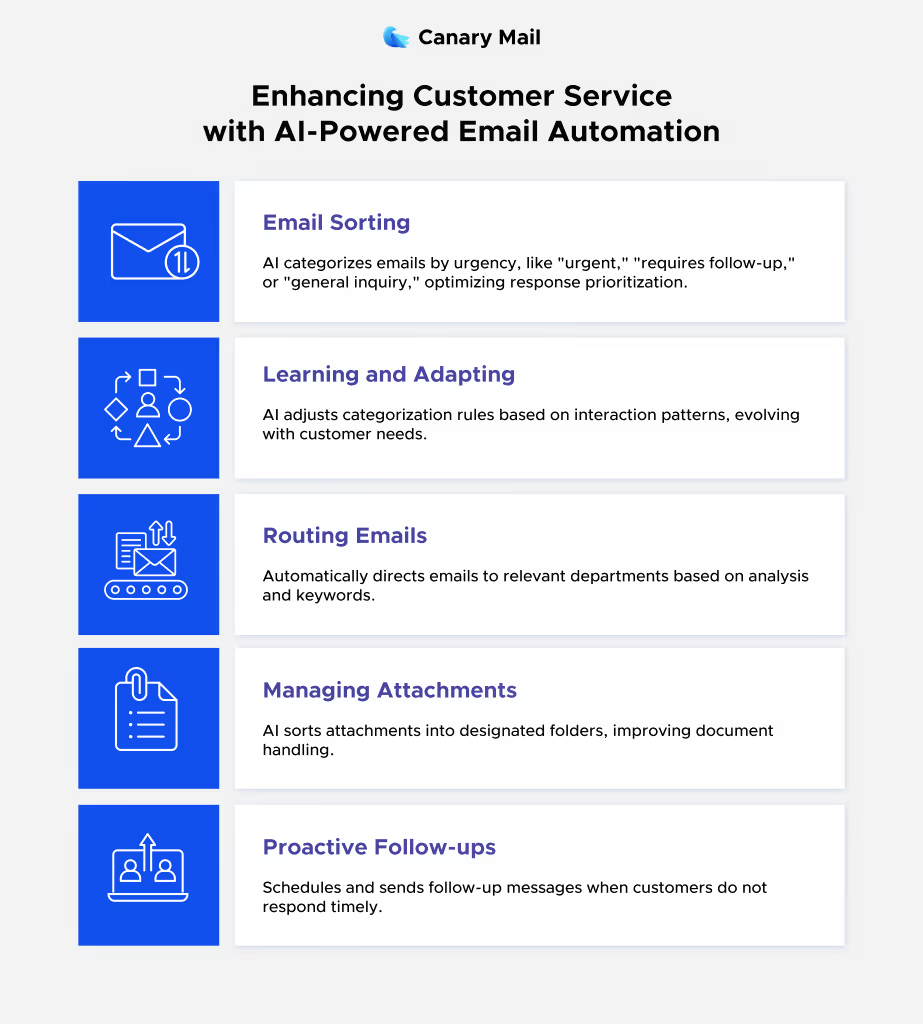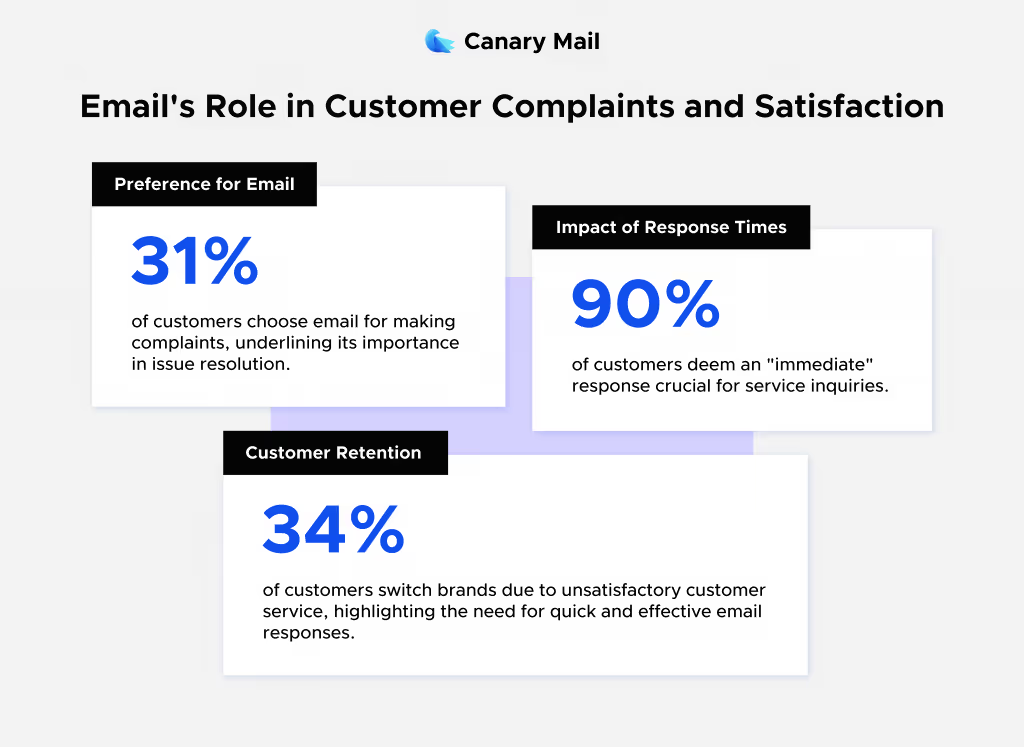Ever written an email to a brand’s customer support team? Whenever you do, you hope for a speedy reply that resolves your issue quickly. But subconsciously, you know you can’t really expect a fast response.
But what if you do get a near-immediate response—and not a generic “we understand your issue” - but a personalized one that actually addresses your concern and provides a solution (or at least peace of mind that you’ll get one soon)?
While providing such an experience for your customers is possible with traditional (manual) email processes, leveraging the best AI email assistant can transform the speed and quality of your email responses, significantly boosting customer satisfaction and loyalty.
In fact, 31% of customers prefer using email when making complaints, highlighting its importance as a primary communication channel in resolving issues. For businesses looking to optimize their email support, exploring customer service tools for small businesses can provide additional insights into building comprehensive support systems.
Email support is not just widely used but also crucial for customer satisfaction. Companies that excel in email customer service see notable benefits, as customers who report positive experiences are substantially more likely to recommend the company. When compared to newer channels like chatbots or social media, email still maintains a unique position for enabling detailed, traceable, formal communication.
In this post, let’s take a look at how AI email assistants are transforming customer service by automating routine tasks, enhancing response quality, and improving communication efficiency, ensuring that businesses can meet and exceed customer expectations.
Automating Routine Tasks
An AI email assistant can enhance the efficiency of routine email tasks within customer service environments. By utilizing machine learning algorithms, AI can analyze email content to assess urgency and relevance, automatically sorting emails into categories such as "urgent," "requires follow-up," or "general inquiry." This automation allows customer service teams to prioritize responses effectively.
AI can also learn from interaction patterns to adjust categorization rules over time, ensuring that the system evolves with the changing dynamics of customer interactions. Beyond email assistants, AI tools for customer support teams encompass a broader range of solutions that can complement email automation, further optimizing the email management process.
Here are a few more examples of what can be automated:
- Routing Emails: AI can automatically direct emails to the appropriate department or individual based on content analysis, keywords, or sender information. For example, all technical support queries could be instantly forwarded to the tech support team, while billing questions go directly to the accounts department.
- Handling Attachments: AI can automatically download and sort attachments into predefined folders based on file type or content, streamlining document management.
- Follow-ups: In cases where a customer doesn't quickly respond, AI can schedule and send follow-up messages based on predefined rules. For instance, if a customer has not replied within 48 hours, the AI system can generate and send a gentle reminder, ensuring that potential issues or queries are proactively addressed.

These automations reduce manual handling, speed up response times, and ensure customer interactions are managed more efficiently and consistently. Teams implementing these workflows often benefit from following shared inbox best practices to maximize collaboration and avoid duplicate responses.
Shared Inbox by Canary is an AI email assistant that lets you speed up routine customer service tasks, such as categorizing incoming emails via its Inbox Tabs feature, helping ensure that urgent communications are prioritized and addressed promptly. This reduces the workload on customer service reps, allowing them to focus on more complex queries while improving overall efficiency and response time.
[cta-block:ctablock1,title="Elevate your team's support workflow with AI-powered assignment and drafting. Explore the next generation of team email at Shared-Inbox.ai.",button="Start Free Trial",buttonlink="https://shared-inbox.ai/?utm_source=canarymail&utm_medium=blog&utm_campaign=ai_email_assistants_for_customer_service"]
Enhancing Response Quality
Your customer support team needs to consistently craft high-quality responses to customer complaints, and AI is here to the rescue for this exact use case.
Imagine having predefined templates tailored perfectly for common questions. This means every response is not just quick, but also consistent and accurate—reflecting your company's standards. For instance, if a customer asks about billing procedures, AI can instantly provide a detailed template response, which the support team agent can tweak to add a personal touch.
Furthermore, consider specific complaints or requests. AI dives deep, analyzing the content of incoming messages as well as past interactions to craft responses that hit the mark every time. This precision ensures that each reply is not just relevant, but also rich in information, improving customer satisfaction.
Ultimately, consistency and accuracy matter: they build trust. With AI-driven solutions, every email is handled with the same care and precision—with no human error—ensuring that your service feels reliable and professional at all times. This consistent accuracy not only helps in enhancing customer experience but also bolsters your brand’s reputation.
Improving Response Times
As we touched upon earlier, AI can quickly analyze and categorize incoming emails. This instant sorting allows customer service reps to readily prioritize urgent emails and instantly draft relevant responses for routine inquiries, dramatically speeding up the support process.
And as you’d expect, quick responses have a profound impact on customer satisfaction and retention, considering 90% of customers rate an "immediate" response as essential when they have a customer service question, and 34% of customers switch brands because they are dissatisfied with customer service.

When customers receive prompt replies, it not only addresses their immediate concerns but also builds trust and confidence in your brand. This responsiveness signals to customers that their time and issues are valued, increasing their overall satisfaction and likelihood to continue giving you business. Additionally, quick and effective communication can turn potential frustrations into positive experiences, encouraging customers to promote your brand through positive reviews and personal recommendations.
Integration with CRM Systems
Integrating AI email assistants with existing CRM systems can help build a seamless customer service experience by automating data synchronization between emails and customer records. This integration allows every customer interaction captured via email to be automatically updated in the CRM, providing real-time insights into customer needs and history.
The CRM integration enables service teams to access comprehensive customer profiles, previous interactions, service issues, and customer feedback and preferences, leading to more personalized and informed responses. This flow of information enables team collaboration through shared inbox features and improves the quality of customer engagements by enabling better personalization.
What’s more, advanced AI email assistants can function as standalone customer support CRMs, offering sophisticated features that go beyond simple CRM integration. They can manage a shared inbox where emails are automatically assigned as tickets to appropriate team members, streamlining the delegation process. These apps can update email statuses in real-time, helping teams track progress and responses efficiently. This capability ensures that nothing slips through the cracks, enhancing team coordination and ensuring that each customer query is addressed promptly and accurately. For teams managing multiple email accounts, unified inbox solutions can further streamline communication workflows.
Having a unified system for tracking customer interactions and history not only enables a more personalized approach to customer service, as representatives can quickly understand the full context of a customer's history with the company, but also facilitates better analytics and reporting, providing insights into trends and customer behavior that can drive strategic decisions and improve service over time.
Wrapping Up
As you can see, AI-driven solutions such as an AI email assistant can be instrumental in enhancing customer experience. AI email assistants can significantly enhance customer service by automating routine tasks, ensuring high-quality responses, reducing response times, and integrating seamlessly with CRM systems.
By adopting an advanced AI email assistant like Shared Inbox by Canary, you can improve your email customer interaction quality and efficiency, leading to greater customer satisfaction and loyalty.
Ready to level up your customer service on email? Try Shared Inbox by Canary for free and experience first-hand the benefits of greater efficiency and efficacy in your customer service operations.
FAQs
What tasks can AI email assistants automate in customer service?
AI email assistants can automate tasks like sorting and prioritizing emails, drafting instant responses to common queries with predefined templates, sending follow-ups, and routing specific issues to the appropriate departments, amongst other things.
How do AI email assistants improve response quality?
AI email assistants ensure consistency and accuracy by utilizing templates tailored for various customer inquiries and by adapting responses based on context and customer history.
Can AI email assistants reduce email response times?
Yes, by automating routine tasks and quickly sorting emails, AI email assistants significantly reduce the time it takes to respond to customer queries while boosting the quality of responses.
How do AI email assistants integrate with CRM systems?
AI email assistants can seamlessly sync with CRM systems, updating customer records and ensuring that all interactions are logged and accessible for future reference. Additionally, beyond integrating seamlessly with CRM tools, advanced AI email assistants can function as complete standalone customer support systems. They manage shared inboxes, assign emails as tickets for specific service issues, and update email statuses to streamline the tracking and delegation processes.
What are the future trends in AI for customer service?
Future trends include the increasing use of natural language processing for a deeper understanding of customer intents, predictive analytics to anticipate customer needs, and more sophisticated personalization to enhance the customer experience.